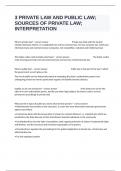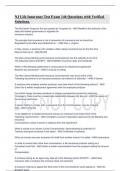Exam (elaborations)
3 PRIVATE LAW AND PUBLIC LAW; SOURCES OF PRIVATE LAW; INTERPRETATION Exam Questions And Correct Verified Answers.
- Course
- Institution
What is private law? - correct answer Private law deals with the mutual relations between citizens. It is subdivided into civil law (contract law, tort law, property law, family law, inheritance law) and commercial law (companies, fair competition, indu...
[Show more]




